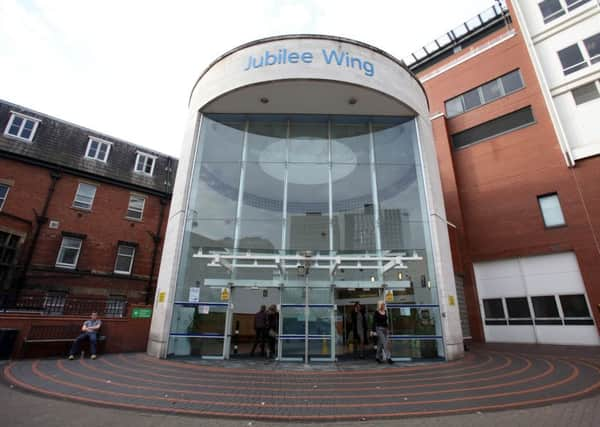Revealed: Leeds NHS Trust spends £200k on taxis for patients


Across the country, millions are being spent every year on transporting patients by private cabs when they are too ill, frail or unable to travel to and from appointments by themselves.
The figures, analysed by the Press Association, come from data supplied to the “Health and Social Care Information Centre” for 2014/15 and from individual trusts.
Advertisement
Hide AdAdvertisement
Hide AdThery reveal that the Leeds Teaching Hospitals NHS Trust - one of the biggest in the UK, which controls Leeds General Infirmary, St James’s Hospital and other centres across the district - spent £211,892 last year.
The trust has two contracts with private taxi firms.
Among the other high spenders are the North East Ambulance Service NHS Foundation Trust, which spent £722,000 on taxis as part of its service to NHS hospitals.
South Tees Hospitals NHS Foundation Trust spent £617,008, while Cambridge University Hospitals NHS Foundation Trust spent £261,338 and University Hospitals Bristol NHS Foundation Trust spent £241,772.
Katherine Murphy, from the Patients Association, said: “There is an exorbitant amount of waste and inefficiency in the NHS and we’ve got to stop it.
Advertisement
Hide AdAdvertisement
Hide Ad“Surely, by putting some time aside for planning patients’ needs, we could use hospital transport far more effectively and not continue to waste money on private taxis?”
A spokesman from Leeds Teaching Hospitals NHS Trust said it saw around 1.5 million patients every year.
“We have a contract with a patient transport provider who normally carries eligible patients with a medical need to and from the hospital. This is backed up by a contract taxi service to provide ad hoc transportation, including for some patients - this may be due to special circumstances or high demand on the usual patient transport vehicles.”
Rotherham NHS Foundation Trust said it planned on cutting its £132,089 bill for taxis while Newcastle Upon Tyne Hospitals NHS Foundation Trust, which spent £84,180, said reasons for using taxis included freeing up bed space on wards.
Advertisement
Hide AdAdvertisement
Hide AdA spokeswoman for the North East Ambulance Service said: “The vast majority of taxi services are procured as part of non-emergency patient transport services to cover pre-arranged non-urgent journeys; for example, transport to and from hospital appointments.
“Where clinically safe to do so, we also use taxi services for patients who are triaged as needing to go to hospital, but who do not need medical intervention on the way there.”
She added: “We have purposefully gone out to contract with reputable taxi services who work to specification so that we know they are safe and caring.”
A spokeswoman for University Hospitals Bristol NHS Foundation Trust said it used its taxi contract for patients and for transporting samples, equipment and notes.
Advertisement
Hide AdAdvertisement
Hide AdLeigh Adams, director of facilities and estates for the trust, added: “UH Bristol has a contract in place with a taxi company to support the trust’s existing transport services.
“This contract went through a tender process to ensure the trust receives a service that is good value for money, without compromising quality and efficiency.”
A spokeswoman for South Tees Hospitals NHS Foundation Trust said: “A large proportion of our taxi costs are incurred by patients receiving treatment from our specialist renal dialysis service, which includes patients in Darlington and North Tees, as well as the South Tees area.
“The spend in specialist services alone was £465,000 due to renal services.”
Advertisement
Hide AdAdvertisement
Hide AdStuart Logan, deputy head of operations for emergency medicine at Leicester’s Hospitals, said: “We treat over one million patients a year so keeping the flow of patients moving through our hospital is crucial. Sometimes that means we have to make the decision to pay for a private taxi for a patient or relative because there is no alternative available.”
Sussex Partnership NHS Foundation Trust, a mental health trust, said its £679,034 spend was mostly for people in the early stages of recovery, after which they are encouraged to start using public transport.
University Hospitals Coventry and Warwickshire NHS Trust , which spent £77,349, said it used taxis to supplement its patient transport service while Royal United Hospitals Bath NHS Foundation Trust, which spent around £100,000, said it covered a wide geographical area.
Unison union general secretary Dave Prentis said: “While taking ill and elderly people to and from hospital in a cab is clearly preferable to making them take the bus or train, taxis are no substitute for an ambulance or a hospital car containing someone who is medically trained.
Advertisement
Hide AdAdvertisement
Hide Ad“If something were to go wrong, it could be dangerous for the patient, and wouldn’t be very fair on the cabbie either.”
Rehana Azam, GMB acting national secretary for public services, said: “The Government keep saying NHS funding is protected, yet sick people are being put in taxis because there are not enough NHS vehicles to safely transport them.”
A spokesman for NHS England said: “For several decades it has been common to contract with non-emergency patient transport providers so as not to tie up emergency ambulances on routine but necessary trips to hospital by patients who qualify for public support.”